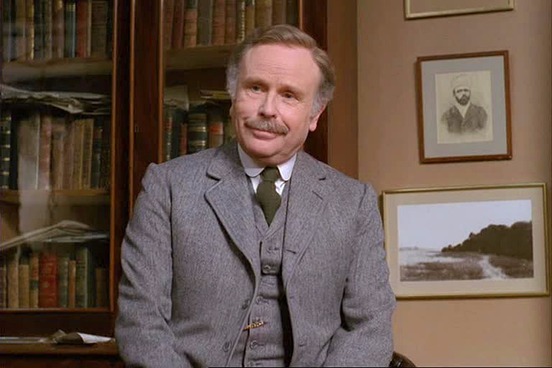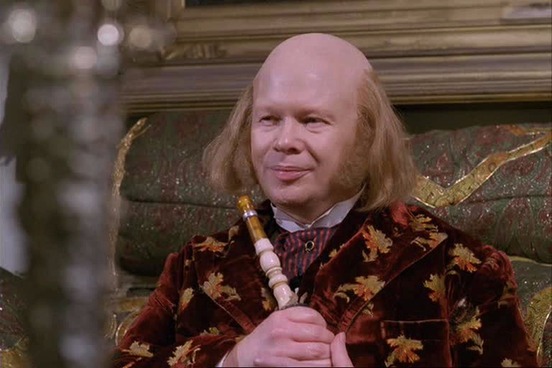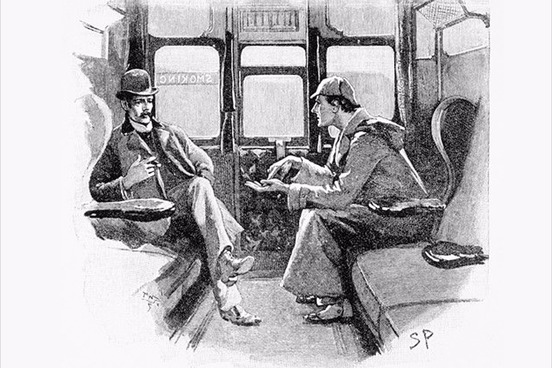
A Way With Words
The Sherlock Holmes canon is filled with language worth exploring, either because of the rarity of the words or because of their unique context.
Interest in the character has had a resurgence in recent years, and seems to be peaking now with the popularity of the eponymous show on MASTERPIECE Mystery!
Delve in: Deerstalker, Ratiocination, and more →

Deerstalker
Definition
: a close-fitting hat with a visor at the front and the back and with earflaps that may be worn up or down
About the Word
Surprisingly, Arthur Conan Doyle never mentions a deerstalker hat in his Sherlock Holmes stories, though he describes Holmes’s “sharp, eager face framed in his ear-flapped travelling cap” in “Silver Blaze.” It was the original illustrator, Sidney Paget, who added this detail to scenes of Holmes in the country (it would have been inappropriate to wear a deerstalker in town, where a top hat or homburg would have been more likely choices). The curved meerschaum pipe associated with Holmes was not in the Doyle stories, either: it was the choice of actor William Gillette and stuck with the character.
Definition
Merriam-Webster defines sociopath as a synonym of psychopath:
: a mentally ill or unstable person; especially: a person affected with antisocial personality disorder
Antisocial personality disorder is defined as:
: a personality disorder that is characterized by antisocial behavior exhibiting pervasive disregard for and violation of the rights, feelings, and safety of others starting in childhood or the early teenage years and continuing into adulthood
About the word
Benedict Cumberbatch’s Sherlock describes himself as a “high-functioning sociopath” in response to being characterized by others as a “psychopath.” The distinction between sociopath and psychopath is subtle; the dictionary regards them as virtually synonymous. Neither term is entered in the standard psychology reference, Diagnostic and Statistical Manual of Mental Disorders, where the preferred term is antisocial personality disorder. Some psychologists assert that sociopaths are nervous, volatile, and disorganized, while psychopaths are careful, manipulative, and charming. A sociopath has a bit of a conscience, but a psychopath has none at all.
Definition
1 : the process of exact thinking : reasoning 2 : a reasoned train of thought
About the Word
Sherlock Holmes was the ultimate logical reasoner in pop culture until Mr. Spock came along. When the first of the Sherlock Holmes films starring Robert Downey, Jr. was released, a form of ratiocination was used in several of the reviews. We can see ratio and rational in ratiocination; they share the same Latin root that means “computation” or “reason.” There’s also the verb ratiocinate and the adjective ratiocinative.
Other Latinate nouns in English that refer to reason or thinking are cogitation and cerebration.

Deduction
Definition
: the deriving of a conclusion by reasoning; specifically : inference in which the conclusion about particulars follows necessarily from general or universal premises
About the word
Holmes himself refers to his method of reasoning as deduction, and the word appears many times in the original stories (as does the verb deduce). A related word is induction, which means “inference of a generalized conclusion from particular instances.” Holmes probably inferred the general from the specific as often as he inferred the specific from the general, but induction is never used in the stories. Unsurprisingly, given the relationship between logic and math, both words also have mathematical meanings.

Gooseberry
Definition
Gooseberry can mean a kind of berry, but it also has a very specific definition found only in the Oxford English Dictionary and Webster’s Unabridged from 1934:
: A chaperon, esp. one who is indulgently unobservant; as, to play gooseberry; a superfluous third person
About the word
In The Hound of the Baskervilles, a romantic meeting between Sir Henry Baskerville and Miss Stapleton takes place despite Holmes’s strict orders that Sir Henry never leave Watson’s sight because of the curse of the “fiend dog.” Sir Henry insists he must go alone, saying to Watson, in dialogue that was invented for the TV version (with Jeremy Brett as Holmes and Edward Hardwicke as Watson): “You’d make a very civil gooseberry, but no—I’m afraid I have to go alone.” Since the scene is recounted in a letter from Watson to Holmes in the original story, this word choice represents a charming piece of faux Victorian English.

Goyal
Definition
Goyal is a spelling variant for goyle found in the Oxford English Dictionary; here's the definition for goyle found in Merriam-Webster’s Unabridged:
dialectal, England : a steep narrow valley : RAVINE, GULLY
About the word
The mystery of The Hound of the Baskervilles begins with a document from 1742 that explains the reason for the curse placed upon the Baskerville family: an ancestor had kidnapped a young woman, and when she escaped, he sent his hunting hounds after her. He followed the hounds on horseback, but when he found them, rather than causing terror, they seemed themselves to be afraid:
Riding slowly in this fashion they came at last upon the hounds. These, though known for their valour and their breed, were whimpering in a cluster at the head of a deep dip or goyal, as we call it, upon the moor, some slinking away and some, with starting hackles and staring eyes, gazing down the narrow valley before them.
Today, we find the Sherlock Holmes stories to be full of charming Victorian and Edwardian detail and language, but they were contemporary to their first readers. In this case, Arthur Conan Doyle wanted to give an archaic tone to the statement of the ancient curse, choosing this colorful word.

Valetudinarian
Definition
: a person of a weak or sickly constitution; especially : one whose chief concern is his or her ill health
About the word
The strange character of Thaddeus Sholto in The Sign of Four is presented as a fidgety and nervous person. Conan Doyle’s description (in Watson's voice) shows how varied and interesting his vocabulary was (befrogged here means "adorned with a front fastening of braid in an ornamental looped design" and closeness means "hot and stuffy conditions"):
Our new acquaintance very deliberately coiled up the tube of his hookah, and produced from behind a curtain a very long, befrogged top-coat with astrakhan collar and cuffs. This he buttoned tightly up, in spite of the extreme closeness of the night, and finished his attire by putting on a rabbit-skin cap with hanging lappets which covered the ears, so that no part of him was visible save his mobile and peaky face. "My health is somewhat fragile," he remarked, as he led the way down the passage. "I am compelled to be a valetudinarian."
Valetudinarian comes from the Latin word for “sickly” or “infirm.”

Queer Street
Definition
: an embarrassing situation or condition; especially : a condition marked by financial difficulties
About the word
Queer Street is used twice in the Holmes stories. Here, by Inspector Lestrade, upbraiding an inattentive constable:
It's lucky for you, my man, that nothing is missing, or you would find yourself in Queer Street.
And here it is used by Watson describing a hotheaded and financially unwise racehorse owner:
Well, he has the name of being a dangerous man. He is about the most daredevil rider in England—second in the Grand National a few years back. He is one of those men who have overshot their true generation. He should have been a buck in the days of the Regency—a boxer, an athlete, a plunger on the turf, a lover of fair ladies, and, by all account, so far down Queer Street that he may never find his way back again.
It isn’t known why Queer Street became the name of an imaginary street where people in financial trouble are supposed to be found, but the term dates from the early 1800s. It’s clearly a case for a linguistic Sherlock Holmes.
Three monosyllabic m words figure prominently in the Holmes stories, but are seldom heard in American English. Appropriately enough, they share origins in Old English, and two of them are labeled as "chiefly British."
Moor
Definition: chiefly British : an expanse of open rolling infertile land
About the word: The setting of “Silver Blaze” and The Hound of the Baskervilles is Dartmoor, a region of moorland in southwestern England. The moor itself becomes an atmospheric and dangerous character in the stories.
Mere
Definition: chiefly British : an expanse of standing water : lake, pool
About the word: Mere as an adjective (a mere scratch; a mere boy in his teens) comes from Latin and is unrelated to the noun mere that means “lake.” Holmes himself uses mere and lake interchangeably in “The Problem of Thor Bridge”:
The papers may ask why the mere was not dragged in the first instance, but it is easy to be wise after the event, and in any case the expanse of a reed-filled lake is no easy matter to drag unless you have a clear perception of what you are looking for and where.
Mire
Definition:
1: wet spongy earth (as of a bog or marsh)
2: heavy often deep mud or slush
3: a troublesome or intractable situation
About the word: Mire comes from a Scandinavian word that is related to the Old English root that gave us moss and marsh. In The Hound of the Baskervilles, mire is also used as part of a place name, the Grimpen Mire, where Stapleton describes a wild pony sinking, as if in quicksand:
“It's gone!” said he. “The mire has him. Two in two days, and many more, perhaps, for they get in the way of going there in the dry weather, and never know the difference until the mire has them in its clutches. It's a bad place, the great Grimpen Mire.”

Trifle
Definition
: something of little value, substance, or importance
About the word
Holmes does use the word clue, as we might expect, but he often uses trifle to describe the kind of small detail, usually missed by others, that leads him to the solution of a case. He says to Watson: “You know my method. It is founded upon the observation of trifles,” and: “It is, of course, a trifle, but there is nothing so important as trifles.”
The idiom a trifle meaning “to some small degree” or “slightly” is also used in the stories: “a trifle rusty”; “a trifle before your time”; “a trifle too obvious.”
Trifle also can mean “a dessert typically consisting of plain or sponge cake often soaked with wine or spirits (as brandy or rum) and topped with layers of preserves, custard, and cream.” Holmes appears not to have been very interested in complicated desserts.







